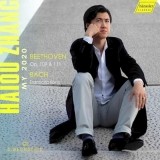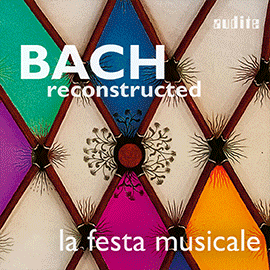 My 2020; Ludwig van Beethoven: Klaviersonaten Nr. 30 & 32 + Kadenz aus Klavierkonzert Nr. 4 (1. Satz) + Bagatelle WoO 59, Für Elise; Johann Sebastian Bach: Largo aus Triosonate BWV 529 (Arr. Feinberg) + Schafe können sicher weiden aus BWV 208 (Arr. Lipatti); Haiou Zhang, Klavier; 1 CD Hänssler Classic HC20079; Aufnahme 10.2020, Veröffentlichung 16.04.2021 (67'25) – Rezension von Remy Franck
My 2020; Ludwig van Beethoven: Klaviersonaten Nr. 30 & 32 + Kadenz aus Klavierkonzert Nr. 4 (1. Satz) + Bagatelle WoO 59, Für Elise; Johann Sebastian Bach: Largo aus Triosonate BWV 529 (Arr. Feinberg) + Schafe können sicher weiden aus BWV 208 (Arr. Lipatti); Haiou Zhang, Klavier; 1 CD Hänssler Classic HC20079; Aufnahme 10.2020, Veröffentlichung 16.04.2021 (67'25) – Rezension von Remy Franck

Der chinesische Pianist Haiou Zhang hat 2020 für Beethoven- und Bach-Einspielungen genutzt. Die beiden ersten Sätze der 30. Sonate op. 109 spielt er mit kraftvollem Zugriff, sehr spontan auch sowie mit einem guten Gefühl für den improvisatorischen Wagemut des Komponisten, für schnelle Wechsel von Drama zu Reflexion und wieder zurück. Abstrakt und konkret zugleich, schafft seine Gestaltung die Balance zwischen dem rein Spielerisch-Technischen und dem Expressiven, zwischen Grübelei und Unruhe. Im 3. Satz zeigt er sich als subtiler Interpret mit gutem lyrischem Empfinden. Es geht ihm dabei nicht so sehr um Gefühlsverströmung, sondern um Klarheit und Strukturierung sowie Abgrenzung der Variationen.
In Beethovens letzter Klaviersonate ist vor allem die Klarheit des Spiels auffallend, das diesen Beethoven sehr kontrastreich und intensiv dramatisch werden lässt. Spannungsvoll und dunkel grollend ist das Maestoso, getrieben das Allegro con brio
Auch die Gefühlswallungen des langsamen Satzes werden gut zum Ausdruck gebracht. Die Komplexität und Orientierungslosigkeit der Arietta mit ihren immer wieder erstaunlichen Variationen wird gekonnt und vor allem sehr spannungsvoll herausgestellt.
Nach den vielen Fragezeichen des letzten Sonaten-Statements von Beethoven, ist das nachdenklich, hin und wieder fast verträumt gespielte Largo aus BWV 529 sehr passend, während die Schafsarie aus BWV 208 uns in lichtere Gefilde entführt. Danach kehrt Haiou Zhang zu Beethoven zurück mit der verspielten Kadenz aus dem 4. Klavierkonzert und der Bagatelle für Elise, die, in gerade mal drei Minuten flüssig und in ihrer Schlichtheit berührend wirkt.
Der Bechstein-Flügel klingt gut, die Aufnahme ist angenehm räumlich.
Chinese pianist Haiou Zhang has used 2020 for Beethoven and Bach recordings. The performance of the first two movements of the 30th Sonata is powerful, very spontaneous too, and shows a good sense of the composer’s improvisatory style of rapid shifts from drama to reflection and back again. Abstract and concrete at the same time, his interpretation strikes a balance between the purely playful-technical and the expressive, between brooding and restlessness. In the 3rd movement he shows himself to be a subtle interpreter with good lyrical feeling. He is not so much concerned with emotional exuberance as with clarity and structuring as well as delineation of the variations.
In Beethoven’s last piano sonata, what is most striking is the clarity of the playing, which makes this Beethoven very contrasting and intensely dramatic. The Maestoso is tense and darkly rumbling, the Allegro con brio driven.
The surges of emotion in the slow movement are also well expressed. The complexity and disorientation of the Arietta, with its ever astonishing variations, is brought out skillfully and, above all, very exciting.
After the many question marks of Beethoven’s last sonata statement, the pensive, now and then almost dreamy Largo from BWV 529 is very fitting, while the Aria from BWV 208 takes us into a lighter atmosphere. Haiou Zhang then returns to Beethoven with the playful cadenza from the 4th Piano Concerto and the Bagatelle for Elise, which, at just three minutes, is fluid and touching in its simplicity.
The Bechstein grand sounds good, the recording is pleasantly spacious.























